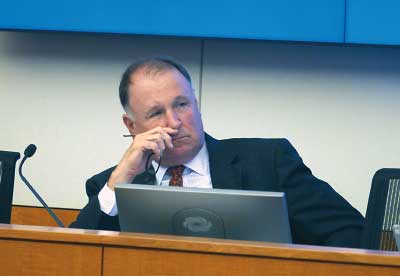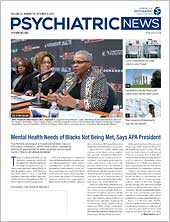Now is our moment in the Commonwealth of Virginia,” said psychiatrist Peter Buckley, M.D., dean of the Virginia Commonwealth University (VCU) School of Medicine, in an address last month before Virginia legislators and mental health advocates during the “Mental Health Mini-University.”
Citing the decision by the Virginia General Assembly earlier this year to expand Medicaid to some 400,000 people in the state under the Affordable Care Act, as well as the election last year of physician Ralph Northam as governor, Buckley told legislators that the state is in a unique position to address mental health workforce needs, access to care, and the opioid epidemic.
“Medicaid expansion will further focus attention on mental health as a priority, as will the ongoing integration of mental health and general medical care,” Buckley said. “We have an opportunity and an obligation to make the most of it.”
Buckley’s remarks were part of an address titled “Mental Health and Workforce Development Solutions,” delivered during a day-long educational session for members of the Virginia General Assembly and a special mental health advisory commission. The brainchild of VCU psychiatry chair Joel Silverman, M.D., the mini-university for legislators was designed to
provide lawmakers up-to-date information about mental health public policy issues. The event was attended by 11 members of the General Assembly and members of the Deeds Commission, a mental health system reform advisory group formed by Virginia Sen. Creigh Deeds in 2013 after the suicide of his son.
Buckley was joined at the event by Mishka Terplan, M.D., M.P.H., a professor of obstetrics, gynecology, and psychiatry and associate director of addiction medicine at VCU. He discussed problems associated with alcohol, marijuana, and opioid use. Terplan emphasized that while the opioid crisis is attracting nationwide attention, alcohol abuse continues to exact an enormous public health toll.
Buckley urged lawmakers to pay special attention to the pipeline of students choosing a career in mental health and to the use of allied professionals, including psychiatric nurses and social workers. With regard to future psychiatrists, Buckley said lawmakers should focus on providing resources for training in high-need specialty areas: forensic/correctional psychology and psychiatry, child psychiatry and developmental pediatrics, and consultation-liaison psychiatry.
He also urged support for use of peer support specialists—patients with mental illness or substance use disorders who are in recovery and can assist in helping others to recovery—as a way to extend the expertise of clinicians. Leveraging technological innovations such as telemedicine is crucial, as is the need for adequate reimbursement for physicians providing telemedicine services.
“The magnitude of need is compelling, especially when one also considers medical-psychiatric comorbidity,” Buckley said. He noted that last year, the National Alliance for Mental Illness (NAMI) ranked Virginia’s mental health system 42nd among the states for access to care. He also cited a 2017 report by NAMI Virginia, which stated that the problem of access to care is tied to “lack of trained professionals working in Virginia, particularly for youth.”
Despite the bad news, Buckley told Psychiatric News after the presentation that he chooses to be optimistic because a number of key factors are coalescing.
“We have a governor who is a physician with a particular interest in mental health. The secretary of Health and Human Services [Daniel Carey, M.D.] is a cardiologist who brings a preventative approach to health care as well as a real interest in mental health. And the commissioner of the Department of Behavioral Health and Developmental Disabilities [Hughes Melton, M.D.] is a family physician who really gets the importance of integrating psychiatry, mental health, and primary care,” Buckley said. “Combined with Medicaid expansion and the compelling mental health needs in the state, I really think all of these things coming together means that this is our moment of opportunity.” ■

